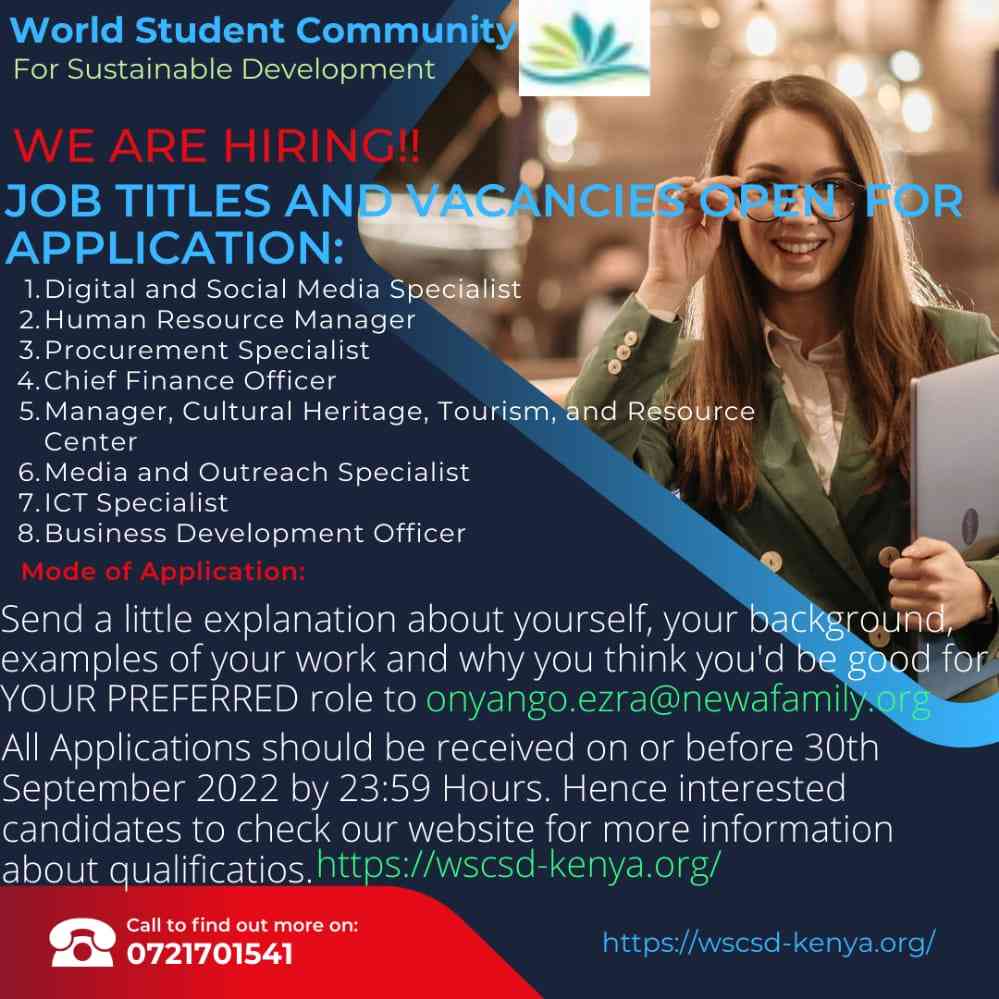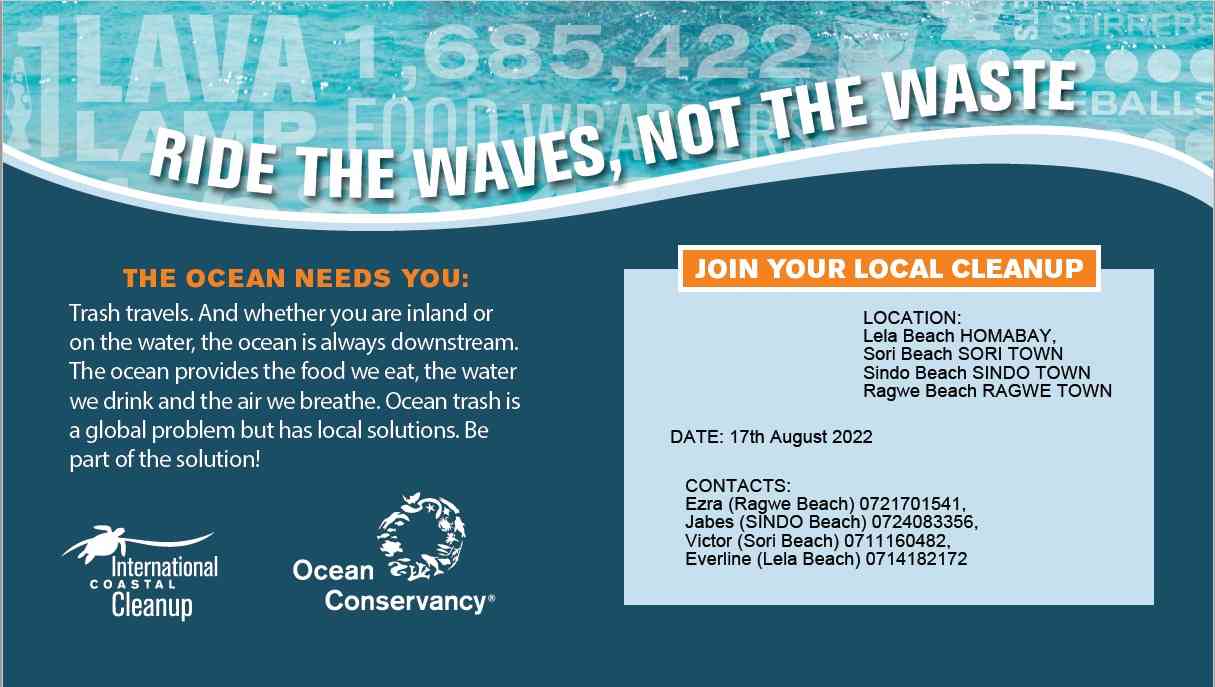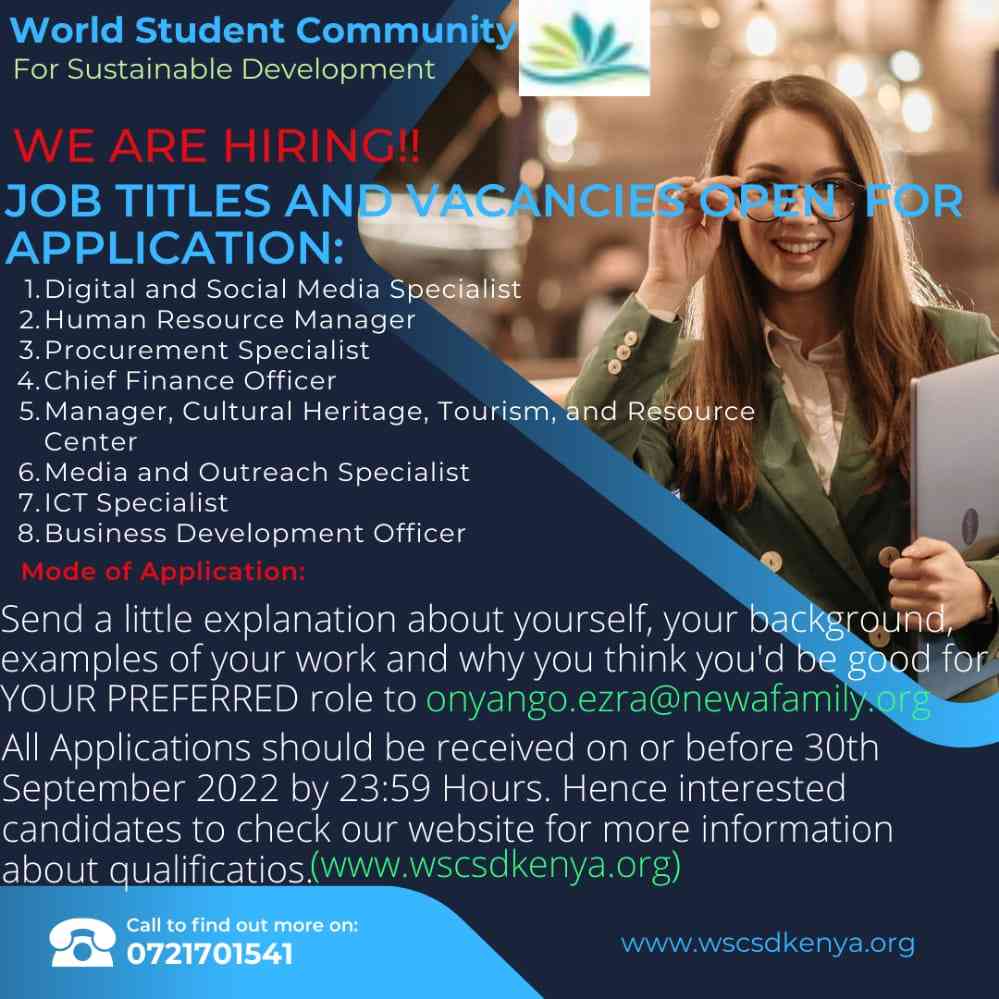GRANT PROPOSAL
Ambassador’s Fund for Cultural Preservation 2022 Grants Program
Application Guide
Summary: The U. S. Embassy, Kenya is pleased to announce the start of applications for the U.S. Ambassadors Fund for Cultural Preservation (AFCP) 2022 Grants Program. The application process involves two rounds: In Round 1, the embassy is accepting project ideas in the form of concept notes, due December 5, 2021. In Round 2, the embassy will invite applicants with promising ideas to submit full project applications, due February 27, 2022. (Please especially note the requirements in point #14.)
Competition Format: In their Round 1 concept notes, applicants should focus on the public diplomacy objectives to be accomplished through the proposed project. Proposals invited to participate in Round 2 will flesh out the technical aspects of the proposed project and submit a full application. Awards will range from $10,000 to $500,000.
Funding Areas: The AFCP Grants Program supports the preservation of archaeological sites, historic buildings and monuments, museum collections, and forms of traditional cultural expression, such as indigenous languages and crafts. Appropriate project activities may include:
a) Anastylosis (reassembling a site from its original parts)
b) Conservation (addressing damage or deterioration to an object or site)
c) Consolidation (connecting or reconnecting elements of an object or site)
d) Documentation (recording in analog or digital format the condition and salient features of an object, site, or tradition)
e) Inventory (listing of objects, sites, or traditions by location, feature, age, or other unifying characteristic or state)
f) Preventive Conservation (addressing conditions that threaten or damage a site, object, collection, or tradition)
g) Restoration (replacing missing elements to recreate the original appearance of an object or site, usually appropriate only with fine arts, decorative arts, and historic buildings)
h) Stabilization (reducing the physical disturbance of an object or site)
4. Sites and Objects Having a Religious Connection: The establishment clause of the U.S. Constitution permits the government to include religious objects and sites within an aid program under certain conditions. For example, an item with a religious connection (including a place of worship) may be the subject of a cultural preservation grant if the item derives its primary significance solely on the basis of architectural, artistic, historical, or other cultural (not religious) criteria.
5. Funding Priorities: In FY 2022, preference will be given to projects that do one or more of the following:
a) Directly support U.S. Embassy public diplomacy priorities.
b) Directly support U.S. policies, strategies and objectives in a country as stated in the Integrated Country Strategy or other U.S. government planning documents.
c) Support disaster risk reduction for cultural heritage in disaster-prone areas or post-disaster cultural heritage recovery.
d) Support conflict resolution and help communities bridge differences.
e) Partner, connect with, or feed into other embassy public diplomacy programs.
6. Eligible Project Implementers: Eligible project implementers are reputable and accountable non-commercial entities that can demonstrate they have the requisite capacity to manage projects to preserve cultural heritage. Eligible implementers may include non-governmental organizations, museums, educational institutions, ministries of culture, or similar institutions and organizations, including U.S.-based educational institutions and organizations subject to Section 501(c)(3) of the tax code. The AFCP will not award grants to individuals, commercial entities, or past award recipients that have not fulfilled the objectives or reporting requirements of previous awards.
Potential implementers must be registered and active in the U.S. government’s System for Award Management (SAM) to receive U.S. federal assistance. The registration process can take several weeks to complete so it is important to avoid any delay. If a project is selected for an award and the registration is not completed, the award could be delayed to the next FY, pending the availability of funding.
7. Round 1 Concept Note Requirements (Deadline: December 5, 2021): Eligible applicants should submit concept notes via e-mail to: NairobiPas@state.gov with the subject line reading: AFCP Concept note.
Each concept note submitted must include:
a) Project basics, including working title, anticipated project length (Note: Applicants may propose project periods of up to 60 months), location/site, and project cost estimate (amount requested from AFCP; in U.S. dollars).
b) Project implementer.
c) Scope of work summarizing (1) the preservation goals and the activities planned to achieve those goals; and (2) any broader host country or community goals and the activities planned to achieve those goals; (i.e., what they hope to gain from the project beyond the preserved heritage and how they plan to get there; 2,000 characters maximum).
d) Rationale for AFCP support, explaining why it’s in the interests of the U.S. government to fund the project (1,000 characters maximum).
e) Five (5) high quality digital images (JPEGs) or audiovisual files that convey the nature and condition of the site, collection, or tradition and show the urgency or need for the proposed project (collapsing walls, water damage, etc.).
8. Round 2 Full Application Requirements (Deadline: February 27, 2022): The applicants selected in Round 1 to submit full applications by no later than Sunday, February 27, 2022. All short-listed candidates will be required to indicate:
a) Project dates (maximum of 60 months [five years]).
b) Statement of importance highlighting the historical, architectural, artistic, or cultural (non-religious) values of the cultural heritage.
c) Revised/detailed scope of work with (1) clear preservation goals and activities for achieving those goals, and (2) Kenya’s or community’s intended broader goals and activities for achieving those goals (Note: When describing and ordering the activities for (1) and (2) above, highlight any major milestones and target dates for achieving them. Each set of activities should clearly lead to their corresponding goals with no gaps. The overall presentation should make a compelling case that the implementer has a clear and comprehensive sense of how to achieve the preservation and other goals).
d) Proof of official permission to undertake the project from the office, agency, or organization that either owns or is otherwise responsible for the preservation and protection of the site or collection.
e) Implementer’s public awareness plan describing how the applicant intends to highlight and amplify AFCP-supported activities through print, electronic, social media, and other means.
f) Maintenance plan outlining the steps or measures that will be taken to maintain the site, object, or collection in good condition after the AFCP-supported project is complete; or, in the case of forms of traditional cultural expression, to preserve and disseminate the documentation, knowledge, or skills gained from the project.
g) Résumés or CVs of the proposed project director and key project participants.
h) Detailed project budget, demarcated in one-year budget periods (2022, 2023, 2024, etc.), that lists all costs in separate categories (Personnel, Fringe Benefits, Travel [including Per Diem], Equipment, Supplies, Contractual, Other Direct Costs, Indirect Costs); indicates funds from other sources; and gives a justification for any anticipated international travel costs.
i) Budget narrative explaining how the costs were estimated (quantity x unit cost, annual salary x percentage of time spent on project, etc.) and any large budget line items.
j) Application for Federal Assistance (SF-424), including Budget Information for Non-Construction Programs (SF-424A), Assurances for Non-Construction Programs (SF-424B), and, if applicable, Disclosure of Lobbying Activities (SF-LLL).
k) Relevant supporting documentation, such as historic structure reports, restoration plans and studies, conservation needs assessments and recommendations, architectural and engineering records, etc., compiled in preparation for the proposed project.
l) As requested by the Center or as appropriate, additional high quality digital images (JPEGs) or audiovisual files that convey the nature and condition of the heritage and show the urgency or need for the proposed project (collapsing walls, extensive water damage, etc.).
9. Cost Sharing and Other Forms of Cost Participation: There is no minimum or maximum percentage of cost participation required. When an implementing partner offers cost sharing, it is understood and agreed that the partner must provide the amount of cost sharing as stipulated in the budget of the application and later included in an approved agreement. The implementing partner will be responsible for tracking and reporting on any cost share or outside funding, which is subject to audit. Cost sharing may be in the form of allowable direct or indirect costs.
10. Ineligible Activities and Unallowable Costs: AFCP does not support the following activities or costs, and the embassy will deem applications requesting AFCP support for any of these activities or costs ineligible:
a) Preservation or purchase of privately or commercially owned cultural objects, collections, or real property, including those whose transfer from private or commercial to public ownership is envisioned, planned, or in process but not complete at the time of application.
b) Preservation of natural heritage (physical, biological, and geological formations, paleontological collections, habitats of threatened species of animals and plants, fossils, etc.) unless the natural heritage has a cultural heritage connection or dimension.
c) Preservation of hominid or human remains.
d) Preservation of news media (newspapers, newsreels, radio and TV programs, etc.).
e) Preservation of published materials available elsewhere (books, periodicals, etc.).
f) Development of curricula or educational materials for classroom use.
g) Archaeological excavations or exploratory surveys for research purposes.
h) Historical research, except in cases where the research is justifiable and integral to the success of the proposed project.
i) Acquisition or creation of new exhibits, objects, or collections for new or existing museums.
j) Construction of new buildings, building additions, or permanent coverings (over archaeological sites, for example).
k) Commissions of new works of art or architecture for commemorative or economic development purposes.
l) Creation of new or the modern adaptation of existing traditional dances, songs, chants, musical compositions, plays, or other performances.
m) Creation of replicas or conjectural reconstructions of cultural objects or sites that no longer exist.
n) Relocation of cultural sites from one physical location to another.
o) Removal of cultural objects or elements of cultural sites from the country for any reason.
p) Digitization of cultural objects or collections, unless part of a larger, clearly defined conservation, documentation, or public diplomacy effort.
q) Conservation plans or other studies, unless they are one component of a larger project to implement the results of those studies.
r) Cash reserves, endowments, or revolving funds (funds must be expended within the award period [up to five years] and may not be used to create an endowment or revolving fund).
s) Costs of fund-raising campaigns.
t) Contingency, unforeseen, or miscellaneous costs or fees.
u) Costs of work performed prior to announcement of the award unless allowable and approved by the embassy’s representative.
v) international travel, except in cases where travel is justifiable and integral to the success of the proposed project or to provide project leaders with learning and exchange opportunities with cultural heritage experts.
w) Individual projects costing less than US $10,000 or more than $500,000.
x) Independent U.S. projects overseas.
11. Award Announcement: Results of the AFCP 2022 Grants Program will be announced in the second half of the year 2022 with projects anticipated to start no earlier than October 1, 2022,
12. Period of Performance: Recipients will be notified through a Notice of Award. A Notice of Award notifies an award recipient that an award has been made and that funds are available for use during the specified award period. The period of performance of the award begins upon the Grants Officer’s signature and the awardee’s countersignature on a Notice of Award. Failure to produce a complete Notice of Award package may result in the nullification of the award.
13. Performance and Deliverables: AFCP 2022 award recipients will be required to submit performance progress reports, federal financial status reports, and final reports on time as specified in the Notice of Award. Upon completion of an AFCP project, the embassy will also ask implementers to respond to an online survey about their project and experience with the AFCP program. In cases where the proposed public diplomacy or other expected impacts may not be fully realized at the immediate conclusion of the project, the embassy may request continued voluntary reporting on specific topics.
14. SAM Registration: An implementing partner must be registered in the U.S. government’s System for Award Management (SAM) prior to receiving U.S, federal assistance unless they meet one of the exemptions specified in the Federal Assistance Directive. The SAM registration process, which requires either a Commercial and Government Entity (CAGE) or a NATO Commercial and Government Entity (NCAGE) code, can take weeks or months, especially for non-U.S. applicants. Non-U.S. based applicants may request a NCAGE code at https://eportal.nspa.nato.int/AC135Public/scage/CageList.aspx . SAM will assign a Unique Entity Identifier (UEI) automatically to any entity registering or renewing its record in the system. Registration in SAM is free: https://sam.gov/ .
15. Disclaimer: Issuance of this funding opportunity does not constitute an award commitment on the part of the AFCP program or the U.S. government. The U. S. Embassy, Kenya reserves the right to waive program formalities and to reduce, revise, or increase project scopes and budgets in accordance with the needs of the program and the availability of funds.
Related

SDI-Kenya Grant

WSCSD/SCL/PR/01-PROCUREMENT AND TENDERING POLICY

NEWA/W/002/2021: SOCIAL PROTECTION REQUEST FORM - NEWA FAMILY

NEWA Family CBO Internship Program

2022 INTERNATIONAL COASTAL CLEANUP

ADVERTISEMENT FOR VACANT POSITIONS
COMPANY PROFILE

CONSERVATION PROJECT PROPOSALS

Nyasare Community Strategic Action Plan

Community Needs Assessment
Nyasare Community Strategic Needs Assessment